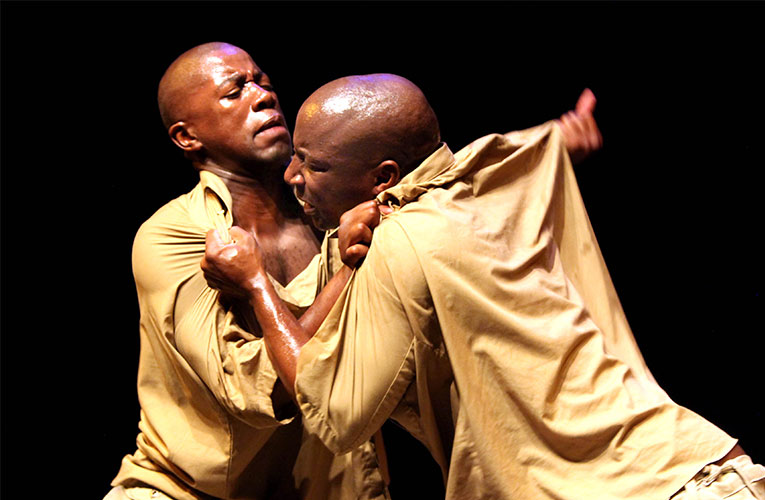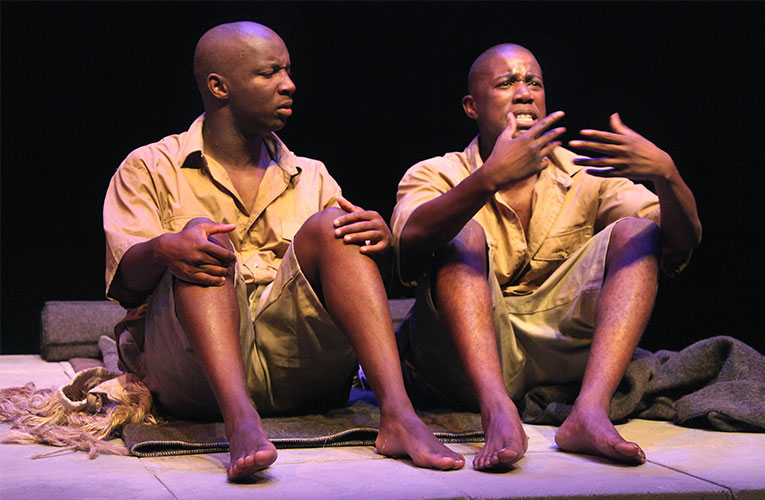Down memory lane of Protest Theatre: The Island, the play that forced America to impose sanctions on apartheid South Africa
By Edward Tsumele
When a court case gets complicated, it sometimes requires that there be a trial within a trial, and that way you know that that case is messy and it will leave everyone involved drained when it is finally resolved.
And so likewise when a play is a play within a play, then you know that you are dealing with a complex issue that is intellectually challenging, as it is theatrically, aesthetically demanding of everyone, from the director to the actors, costume designers, stage managers and lighting designers. You get one of these essential elements wrong, you are sure to collapse the whole production.
And so playwrights, Athol Fugard, John Kani and Winston Ntshona in 1973, must have badly, like everyone else, wanted to get into Robben Island and dissect for the public the goings on in the then infamous island -turned prisoner for political activists. After all this is the place that held the people’s leaders such as its most famous inmate Nelson Mandela and others such as Govan Mbeki, Walter Sisulu, Ahmed Kathrada and others during apartheid.

But of course the three playwrights could not go there as it was a no go area at the time, and actually they had no intention of going there physically, and so they created their own Robben island in their heads that they eventually wrote down as a play that the titled The Island. It must have been a question of If they will not allow you to go to Robben Island, then create your own Ireland, and so they did by creating a stage play.
They put their play on stage, complete with characters, and the results were far reaching, reaching powers beyond the borders of South Africa.
This is the story of The Island, the stage play that reportedly forced America to take action against the apartheid government by imposing sanctions on the country during apartheid, and that is a clear demonstration of a brand of theatre known as Protest Theatre in South Africa, that was mainly staged at the Market Theatre as part of its struggle to free the country from the chains of the oppressive apartheid government of yesteryear.
This play has since been performed in several countries over the years, and it continues to be appreciated even today, long after freedom was attained.
The Market Theatre, in association with JK productions, for example, staged another iteration of The Island in 2013, directed by Kani, and starring Kani’s actor son Atandwa Kani and Nat Ramabulani, and was billed as a classic with a new twist.
This iteration performed against the background that the world has changed very significantly since this play was first performed in 1973, when it was illegal for three playwrights to meet, let alone collaborate on a rebellious piece of literature.
But through the creation of this brilliant two-hander, Fugard, John Kani and Ntshona brought to life a tale that took the world by storm and helped to persuade America to impose sanctions in South Africa.
The Island tells the story of two prisoners on Robben Island, John and Winston, who are rehearsing a performance of Sophocles’ Antigone. When John learns his sentence is being reduced, the men’s friendship is tested.
The play explores the parallels between Antigone’s fight against political and patriarchal boundaries and the imprisoned men’s fight for dignity. The Island stands as a testament to the resiliency of the human heart, spirit and beliefs.
This time around, the play was performed by a new generation of brilliant actors: Atandwa Kani, who was last seen at the Market in The Miser, played John; and Ramabulana, last seen in The Girl in the Yellow Dress at the Market Theatre previously, played Winston.
John is a dreamy idealist, desperate to make a success of their two-man production of Antigone, who also has his eye on his impending freedom and Winston is a more reluctant performer.
Recent reruns of classic South African plays at the Market – including Siswe Banzi is Dead and Woza Albert! – have proved that there is a huge audience for these plays – especially as interpreted by the new generation of theatre practitioners. The Island is just as resonant in today’s South Africa as it was when it first appeared – as we are still doing battle in our contemporary democracy for freedom of expression, and how that might be at odds with the dignity of the State. Talk about how the more things change, the more they seem to remain the same.
The Island (2013) Credits
Authors Athol Fugard, John Kani , Winston Ntshona
Director John Kani
Lighting Designer Nomvula Molepo
Set & Costume Designer John Kani
Stage Manager Thulani Mngomezulu
Cast Character
Atandwa Kani John
Nat Ramabulana Winston
Season: 16 January – 24 March 2013
Press Night: Saturday 19 January 2013
Venue: The Barney Simon Theatre
CITYLIFE/ ARTS Disclaimer: This article only refers to the 2013 production of The Island and no current show is on at the moment, and we are only publishing this article in the context of Heritage Month and the Protest Theatre legacy championed mainly by the Market Theatre during the dark years of the struggle for freedom.










